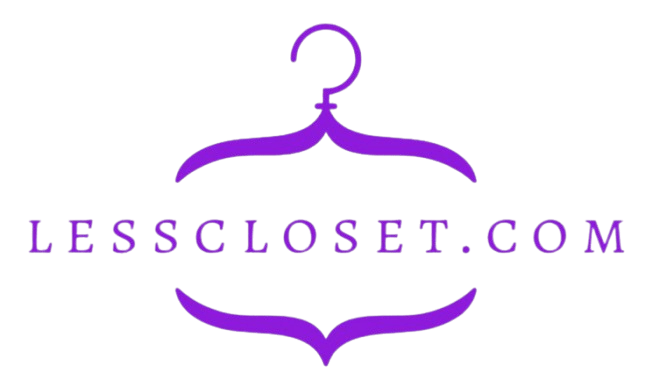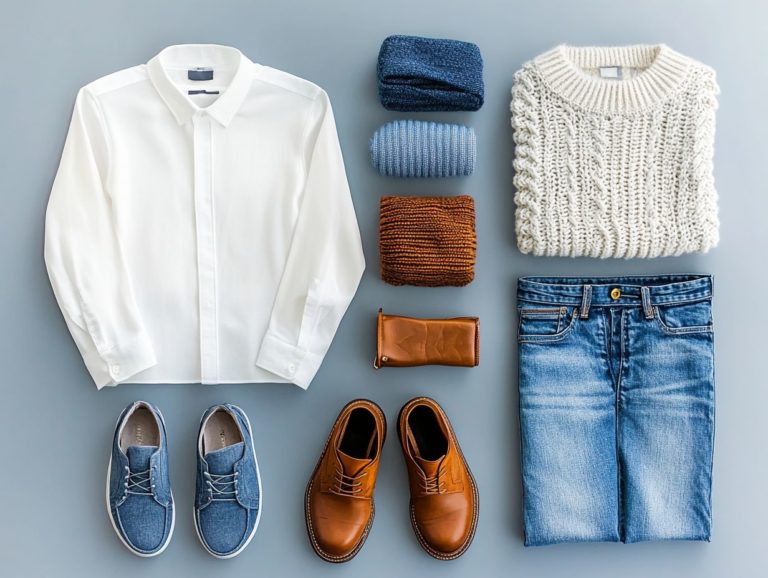What is Sustainable Fashion?
Sustainable fashion goes beyond just being trendy; it represents a crucial movement aimed at transforming how we produce and consume clothing.
This exploration seeks to define what sustainable fashion really means and delves into its significance for both the environment and society. Key principles such as “reduce, reuse, recycle” and fair trade practices will be illuminated, offering you practical avenues to support this vital movement.
This piece will discuss the challenges facing sustainable fashion today, alongside the innovative solutions emerging to create a more ethical future.
Join us in exploring the importance of mindful choices in your wardrobe!
Contents
Key Takeaways:

- Sustainable fashion is the practice of producing and consuming clothing in an environmentally and socially responsible way.
- Support sustainable fashion to reduce environmental harm and promote fairness.
- Principles of sustainable fashion include reducing waste, using ethical production methods, and supporting fair trade.
Understanding Sustainable Fashion
Understanding sustainable fashion is essential in today s swiftly changing fashion landscape, where consumer spending increasingly reflects a desire for eco-conscious apparel that resonates with values of ethical sourcing, environmental sustainability, and social responsibility.
This shift towards conscious fashion isn’t just a fleeting trend; it embodies the future of the industry, championing responsible practices that reduce environmental impacts and foster a circular economy a system aimed at minimizing waste and making the most of resources.
By prioritizing slow fashion principles, which focus on making clothing last longer and reducing waste, and supporting sustainable brands, you can help mitigate the pitfalls of fast fashion, which plays a significant role in pollution and waste generation.
Defining Sustainable Fashion
Sustainable fashion embodies clothing designed, produced, and marketed with the goal of minimizing environmental and social impacts, all while promoting ethical practices that resonate with your values as a conscious consumer.
At its essence, this movement challenges the fast fashion industry, which often wreaks havoc on both the planet and the people who inhabit it. By choosing to invest in high-quality, timeless pieces instead of fleeting trends, you contribute to a more sustainable clothing ecosystem.
But it goes beyond simply buying garments. The slow fashion movement places significant emphasis on upcycling the process of transforming waste materials into new products and repurposing textiles, which helps reduce waste and extends the lifecycle of materials. Every choice you make carries weight, reinforcing the notion that responsible purchasing not only supports fair labor practices but also protects the environment for generations to come.
The Importance of Sustainable Fashion
The significance of sustainable fashion is paramount, as it confronts the pressing environmental challenges and social responsibilities associated with conventional clothing production methods.
These traditional practices often play a major role in pollution and climate change, making it essential for you to consider the profound impact your choices have on the planet and society. Embracing sustainable fashion is not just a trend; it s a commitment to a healthier world.
Environmental Impact
The environmental impact of the fashion industry is significant, with traditional practices leading to pollution, excessive chemical usage, and global water contamination that jeopardize ecological balance.
Fast fashion only intensifies these challenges, contributing to an alarming surge in textile waste millions of tons of clothing find their way to landfills each year. This linear production model not only drains essential resources like water and fossil fuels but also neglects the lasting effects of overconsumption.
To tackle this urgent issue, many are exploring sustainable fashion options that prioritize recycling, the use of renewable materials, and a more measured production cycle.
By embracing these innovative methods, the fashion industry can drastically reduce its ecological footprint, fostering a more responsible and harmonious relationship with our planet.
Social Responsibility

Social responsibility in sustainable fashion emphasizes ethical sourcing of materials. It also commits to fair trade practices that honor garment workers’ dignity and working conditions.
This goes beyond mere compliance. It s a call for brands to embrace transparency throughout their entire supply chain.
By openly revealing where and how their products are made, companies can build trust with consumers who increasingly desire to make informed purchasing decisions.
Take brands like Everlane and Patagonia, for example. They have made significant strides in this area, showing their care for the environment and ethical labor.
The rise of conscious consumerism signals a shift in priorities. Customers are actively seeking out brands that champion sustainability and social justice.
This collective effort is compelling the fashion industry to adopt better practices that benefit both people and the planet.
Principles of Sustainable Fashion
The principles of sustainable fashion are anchored in the core concepts of reduce, reuse, and recycle. This philosophy champions slow fashion approaches that emphasize quality and ethical production methods.
It places far greater value on integrity than on sheer volume. By adopting these tenets, you embrace a more thoughtful and responsible way of engaging with fashion.
Reduce, Reuse, Recycle
The mantra of ‘Reduce, Reuse, Recycle’ is essential in sustainable fashion. It guides you to engage in waste reduction and make informed decisions about how you dispose of clothing.
By appreciating the significance of each aspect, you can actively contribute to a more eco-friendly lifestyle. Reducing consumption begins with mindful shopping habits.
Here, you thoughtfully evaluate the value and longevity of each purchase. Reusing can spark creativity; consider transforming old garments into fresh pieces or donating them to those in need.
Recycling plays a crucial role in minimizing textile waste. As sustainable brands increasingly embrace recycling practices, you lessen your environmental impact.
This approach supports a system where products are reused and recycled, known as a circular economy. It keeps textiles in use longer, significantly benefiting the planet.
Fair Trade and Ethical Production
Fair trade and ethical production stand as cornerstones of sustainable fashion. They ensure that the products you choose are crafted under ethical working conditions.
By prioritizing these principles, brands showcase their dedication not only to quality but also to the well-being of workers and their communities.
More fashion companies are now embracing fair trade practices, which typically involve paying fair wages and ensuring safe working environments.
This evolution initiates a ripple effect. It fosters local economies, minimizes environmental impacts, and encourages responsible consumption among consumers like you.
Ethical brands elevate the fashion narrative, transforming shopping into a conscious choice. This choice enables artisans and reflects a deepening awareness of the industry s broader implications.
Ways to Support Sustainable Fashion
Supporting sustainable fashion requires you to take deliberate actions that encourage mindful shopping. By choosing to invest in sustainable brands, you align yourself with those that prioritize ethical practices.
Join the movement and make a difference today!
Shopping Mindfully

Shopping mindfully in sustainable fashion means being intentional about your choices regarding ethical clothing and selecting eco-friendly products that resonate with your personal values.
To cultivate a more conscious approach, start by evaluating the lifecycle of your clothing. Consider how items are produced, how they re worn, and ultimately, how they re disposed of. This awareness allows you to recognize the long-term effects of fast fashion, which often leads to environmental degradation and fuels a throwaway culture.
By prioritizing brands that commit to sustainable practices like using organic materials, ensuring fair labor conditions, and implementing responsible production methods you can make choices that significantly reduce your ecological footprint. Embracing second-hand shopping or supporting local artisans can also enhance the sustainability of your wardrobe, making your fashion choices not just stylish, but also purposeful.
Supporting Sustainable Brands
Supporting sustainable brands is essential for promoting sustainable fashion, as these companies prioritize ethical sourcing and transparency in their practices.
When you choose to back these brands, you play a pivotal role in guiding the industry toward better environmental practices, such as green fashion and ethically made products. Your choices can spark real change in production methods and circular fashion models, and consumer behavior. For example, brands like Patagonia and Everlane have not only captured the spotlight but have also established benchmarks for responsible production. They focus on durability and timelessness, while ensuring animal welfare and reducing global water pollution rather than fleeting trends. This shift reduces waste and inspires other companies to embrace sustainable practices that prioritize transparency in fashion and environmental justice, illustrating that consumer demand for ethical fashion can drive substantial change within the industry.
Challenges and Solutions for Sustainable Fashion
The challenges you encounter in sustainable fashion are considerable, especially when you consider the fast fashion crisis exacerbated by waste and carbon footprint concerns, which intensify environmental issues and undermine ethical practices within the industry.
Obstacles to Overcome
Obstacles to sustainable fashion lie heavily on the shoulders of fast fashion, which prioritizes rapid production and low prices often at the expense of pollution reduction and ethical standards.
This scenario is further complicated by consumer behavior that tends to favor convenience over conscious choices that align with good practices for clothing lifecycle management, causing many to overlook the environmental and social costs of their purchases. A significant lack of awareness regarding the advantages of sustainable practices persists among shoppers, who may not fully understand how their decisions contribute to broader issues like climate change and labor exploitation, as well as a lack of impact on environment awareness regarding water consumption and upcycling textiles.
Industry inertia plays a crucial role, as many companies hesitate to shift established practices due to perceived risks, potential growth potential of adopting renewable practices, or financial implications. To address these challenges, we need education initiatives focused on the fashion industry and brands like Good On You. These initiatives equip consumers with the knowledge they need and inspire the industry to embrace more responsible practices.
Innovative Solutions
Innovative solutions in sustainable fashion center around recycling practices, circular fashion models, and creative strategies in fashion, such as upcycling textiles (reusing old fabrics to create new products) and promoting mindful consumption. These approaches not only promote sustainability but also tackle the industry’s urgent challenges.
Various brands are embracing cutting-edge technologies to transform the landscape of sustainable fashion. These technologies enhance ecological balance and support clothing disposal in an environmentally friendly way. For example, advanced sorting technologies and chemical recycling methods are being utilized to boost textile recycling efficiency and minimize waste. They breathe new life into discarded materials, giving fabrics a second chance.
Exciting community-based projects are also emerging, nurturing grassroots movements that encourage mindful consumption and educate the public on sustainable practices. This ultimately fosters a cultural shift towards more responsible fashion choices that reflect a commitment to addressing environmental justice.
Frequently Asked Questions
What is Sustainable Fashion?
Sustainable fashion is an approach to the design, production, and consumption of clothing and accessories that aims to have a positive impact on the environment, society, and economy. It considers everything from making the clothes to throwing them away and strives to minimize its environmental and social footprint.
How is Sustainable Fashion different from traditional fashion?
Sustainable fashion takes into account the environmental and social impacts of the fashion industry, whereas traditional fashion primarily focuses on profit and trends. Sustainable fashion also prioritizes ethical and responsible practices, such as using eco-friendly materials and ensuring fair labor conditions, while traditional fashion may prioritize cost-cutting measures and fast production.
What are some key principles of Sustainable Fashion?
The key principles of Sustainable Fashion include using eco-friendly and organic materials, reducing waste and pollution, promoting fair labor conditions, and creating products that have a long lifespan. It also involves supporting local and traditional artisans, using renewable energy sources, and minimizing carbon emissions throughout the supply chain.
Why is Sustainable Fashion important?
Sustainable Fashion is important because the traditional fashion industry has a significant negative impact on the environment and people. It is one of the largest polluters in the world, consumes vast amounts of resources, and often exploits workers in developing countries. By embracing sustainable practices now, we can make a difference and create a more responsible and ethical fashion industry.
How can consumers support Sustainable Fashion?
Consumers can support Sustainable Fashion by making conscious and informed purchasing decisions. This includes buying from brands that prioritize sustainability, choosing high-quality and long-lasting products, and caring for and repairing their clothes instead of constantly buying new ones. Consumers can also educate themselves on sustainable fashion practices and advocate for change within the industry.
What is the role of fashion brands in promoting Sustainable Fashion?
Fashion brands have a responsibility to promote and implement sustainable practices in their operations. This includes using sustainable materials, reducing waste and emissions, and ensuring fair labor conditions. Brands can also educate their consumers about sustainable fashion and provide more eco-friendly and ethical options. By leading the way, fashion brands can help drive the industry towards a more sustainable future.







